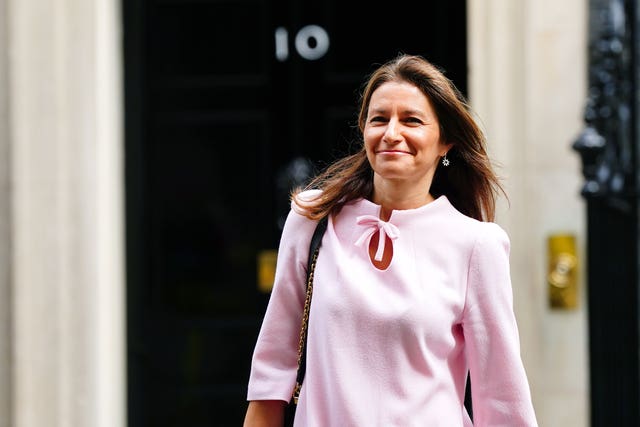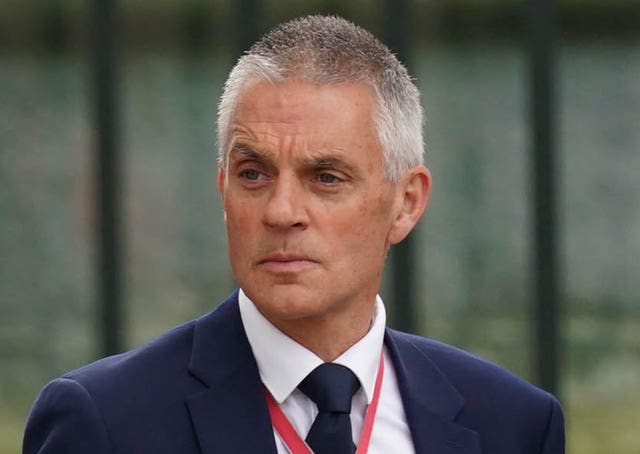Culture Secretary Lucy Frazer has said BBC director-general Tim Davie has assured her the corporation is “investigating swiftly and sensitively” into allegations that an unnamed presenter paid a teenager for sexually explicit images.
Ms Frazer described the allegations reported by The Sun newspaper as “deeply concerning” and said the broadcaster now needs to be given space to investigate the matter and take appropriate action.
Her comments come after the Culture Secretary urgently spoke to Mr Davie on Sunday as the BBC came under pressure over its handling of the complaint.
Following the phone call, she tweeted: “I have spoken to BBC director-general Tim Davie about the deeply concerning allegations involving one of its presenters.
“He has assured me the BBC are investigating swiftly and sensitively.”
She added: “Given the nature of the allegations it is important that the BBC is now given the space to conduct its investigation, establish the facts and take appropriate action. I will be kept updated.”
 Culture Secretary Lucy Frazer described the allegations reported by The Sun newspaper as ‘deeply concerning’ (Victoria Jones/PA)
Culture Secretary Lucy Frazer described the allegations reported by The Sun newspaper as ‘deeply concerning’ (Victoria Jones/PA)
The newspaper said the BBC star paid the person, said to have been 17 when the payments began, £35,000 in exchange for the images.
A DCMS spokeswoman previously said: “These allegations are deeply concerning.
“As a public service broadcaster in receipt of public funding, senior officials have stressed to the BBC that the allegations must be investigated urgently and sensitively, with the department kept informed.”
It is the latest crisis for Mr Davie to respond to after he survived calls to resign over his handling of Gary Lineker being briefly taken off air in March after the football pundit criticised Home Secretary Suella Braverman’s “cruel” asylum policy.
The teenager’s mother told The Sun she saw a picture of the presenter on her child’s phone “sitting on a sofa in his house in his underwear”.
The mother said she was told it was “a picture from some kind of video call” and looked like he was “getting ready for my child to perform for him”.
The family were said to have complained to the BBC on May 19 but allegedly became frustrated that the star remained on air. It is understood he is not due to be on air in the near future. he BBC has been urged to act “very swiftly” to deal with the claims.
 BBC director-general Tim Davie (Jacob King/PA)
BBC director-general Tim Davie (Jacob King/PA)
Victoria Atkins, the financial secretary to the Treasury, told Sky’s Sophy Ridge On Sunday programme: “These are very, very serious allegations and the BBC have said they have processes in place.
“But as public attention and concern grows the BBC is going to have to act very swiftly to deal with these allegations and to set out what they are doing to investigate them.”
Shadow chancellor Rachel Reeves urged the broadcasters to “speed up their processes” in investigating such allegations, describing their response time as “not good enough” when she appeared on the BBC’s Sunday With Laura Kuenssberg.
Former home secretary Priti Patel said the BBC’s response has been “derisory”, adding: “They must provide the victim and his family a full and transparent investigation.
“The BBC, which is funded by licence fee-payers, has become a faceless and unaccountable organisation.”
Media lawyer Mark Stephens said the BBC handling of the complaint had been a “shambles”, arguing it had “really dropped the ball”.
“And it does seem that they’ve also caused this to escalate, because it was the frustration with the BBC not acting that led to the family to go to the Sun newspaper,” he told Times Radio.
“And that I think is reckless, because of course what has happened is we’ve seen all this conjecture on social media.”
A number of BBC stars publicly said they were not the presenter at the centre of the allegations, amid heavy speculation about the identity on social media.
Gary Lineker tweeted: “Hate to disappoint the haters but it’s not me.”
Rylan Clark wrote: “Not sure why my name’s floating about but re that story in the Sun – that ain’t me babe. I’m currently filming a show in Italy for the BBC, so take my name out your mouths.”
Jeremy Vine said: “Just to say I’m very much looking forward to hosting my radio show on Monday — whoever the ‘BBC Presenter’ in the news is, I have the same message for you as Rylan did earlier: it certainly ain’t me.”
Nicky Campbell suggested he had contacted police about being falsely mentioned online in connection with the story.
He tweeted a screenshot which featured the Metropolitan Police logo and the words: “Thank you for contacting the Metropolitan Police Service to report your crime.”
“I think it’s important to take a stand. There’s just too many of these people on social media. Thanks for your support friends,” he wrote.
A BBC spokesperson said: “We treat any allegations very seriously and we have processes in place to proactively deal with them.
“As part of that, if we receive information that requires further investigation or examination we will take steps to do this. That includes actively attempting to speak to those who have contacted us in order to seek further detail and understanding of the situation.
“If we get no reply to our attempts or receive no further contact that can limit our ability to progress things but it does not mean our enquiries stop.
“If, at any point, new information comes to light or is provided – including via newspapers – this will be acted upon appropriately, in line with internal processes.” By NAOMI CLARKE, SAM BLEWETT AND DAVID LYNCH, PA REPORTERS, Irish Examiner






